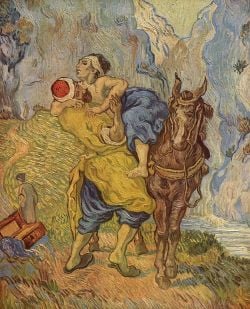|
|
| (2 intermediate revisions by the same user not shown) |
| Line 1: |
Line 1: |
| | {{Main page article box| | | {{Main page article box| |
| | type=Popular| | | type=Popular| |
| − | title=Constantinople| | + | title=Conscience| |
| − | image_name=Constantinople.png| | + | image_name=Vincent Willem van Gogh 022.jpg| |
| − | image_desc=A map of '''Constantinople'''. Also see a [http://www.unc.edu/awmc/downloads/connorConstLblMed.jpg more detailed map.]| | + | image_desc=''The good Samaritan'' (after Delacroix) by [[Vincent van Gogh]]| |
| − | text='''[[Constantinople]]''' (Greek: Κωνσταντινούπολη) was the capital of the [[Byzantine Empire]] and, following its fall in 1453, of the [[Ottoman Empire]] until 1930, when it was renamed Istanbul as part of [[Mustafa Kemal Atatürk]]'s Turkish national reforms. Strategically located between the Golden Horn and the Sea of Marmara at the point where [[Europe]] meets [[Asia]], Constantinople was extremely important as the successor to ancient Rome and the largest and wealthiest city in Europe throughout the [[Middle Ages]], it was known as the "Queen of Cities." | + | text=The '''conscience''' refers to a person’s sense of right and wrong. Having a conscience involves being aware of the [[moral]] rightness or wrongness of one’s actions, or the [[goodness]] or badness of one’s intentions. In a [[Christian]] context, conscience is often conceived as a faculty by which [[God]]’s moral laws are known to human beings. Being ‘judged’ by one’s conscience can lead to [[guilt]] and other ‘punitive’ [[emotion]]s. }} |
| − | | |
| − | The city has had many names throughout history. Depending on the background of people, and their language and ethnicity, it often had several different names at any given time; among the most common were Byzantium, New Rome, Constantinople and ''Stamboul''. Usually, the name Constantinople refers to the period from its founding by [[Constantine I]] to the Muslim conquest.}}
| |
The
conscience refers to a person’s sense of right and wrong. Having a conscience involves being aware of the
moral rightness or wrongness of one’s actions, or the
goodness or badness of one’s intentions. In a Christian context, conscience is often conceived as a faculty by which
God’s moral laws are known to human beings. Being ‘judged’ by one’s conscience can lead to
guilt and other ‘punitive’
emotions.
